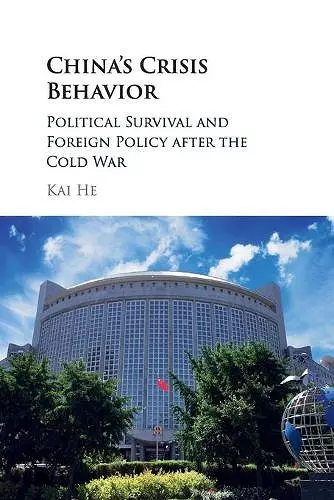China's Crisis Behavior
Political Survival and Foreign Policy after the Cold War
Format:Paperback
Publisher:Cambridge University Press
Published:1st Mar '18
Currently unavailable, and unfortunately no date known when it will be back
This paperback is available in another edition too:
- Hardback£90.00(9781107141988)

The first study to systematically analyze the patterns of China's foreign policy crisis behavior after the Cold War.
Drawing from a wealth of primary sources and interviews, this book offers a systematic analysis of China's crisis behavior since the Cold War. It proposes a new framework to help identify the factors which determine whether Chinese leaders decide to escalate or scale down their response to situations of crisis.Since the end of the Cold War, China has experienced several notable interstate crises: the 1999 'embassy bombing' incident, the 2001 EP-3 mid-air collision with a United States aircraft, and the Diaoyu/Senkaku dispute with Japan. China's response to each incident, however, has varied considerably. Drawing from a wealth of primary sources and interviews, this book offers a systematic analysis of China's crisis behavior in order to identify the factors which determine when Chinese leaders decide to escalate or scale down their response to crises. Inspired by prospect theory - a Nobel Prize-winning behavioral psychology theory - Kai He proposes a 'political survival prospect' model as a means to understand the disparities in China's behavior. He argues that China's response depends on a combination of three factors that shape leaders' views on the prospects for their 'political survival status', including the severity of the crisis, leaders' domestic authority, and international pressure.
'Kai He provides an excellent analysis of China's inter-state crises behaviour in the post-Cold War era. By combining insights from prospect theory and regime survival theory, he offers a valuable analysis of a crucial set of cases in a rigorous fashion. This book is not only useful for Sinologists, but also for anyone interested in China's sometimes enigmatic behaviour in its relations with other states.' T. V. Paul, James McGill Professor of International Relations, McGill University, Montréal
'Kai He's cutting edge study of Chinese crisis management is essential reading for students of Chinese foreign policy as well as anyone seeking insights into an increasingly assertive twenty-first century China. China's Crisis Behavior operationalizes an elegant and innovative theoretical framework to examine a timely and critically important topic for Asia and the world. This pioneering volume provides comprehensive and authoritative treatment of multiple cases of Chinese crises spanning a twenty-year period under three different paramount Chinese leaders, including current President Xi Jinping. Highly recommended.' Andrew Scobell, Senior Political Scientist, RAND Corporation
'When embroiled in international crises, Chinese leaders escalate in some cases, yet accommodate, even compromise in others: why? In this astute, original book, Kai He argues that nothing about Chinese leaders' international crises behavior can be understood without grasping how they see their prospect for political survival. Their perceptions of gains and losses are shaped by international pressure, the severity of the crisis, and the leaders' domestic authority which combine to define China's responses. With a concern for the choices of individual leaders in crisis situations, Kai He cleverly puts to the task prospect theory, the most influential descriptive theory of decision making under risk, and relies on a wealth of fresh sources to help us understand how Chinese leaders are likely to behave when the next crisis erupts. For anyone interested in China's rise, crisis diplomacy and the political psychology of strategy, this is an essential read.' Pascal Vennesson, Nanyang Technological University, Singapore
ISBN: 9781316506783
Dimensions: 230mm x 153mm x 10mm
Weight: 290g
184 pages